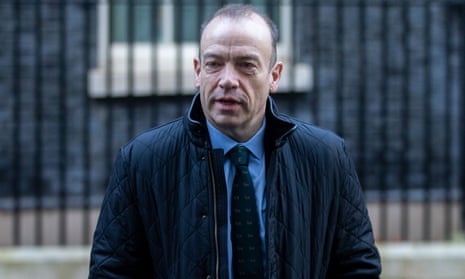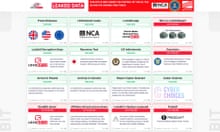A second cabinet minister has said they fell victim to hackers and was forced to apologise after their Twitter account posted a series of offensive tweets about race, sexuality and gender identity.
Chris Heaton-Harris, the Northern Ireland secretary, said others temporarily gained access to his account and posted some “deeply unpleasant stuff”.
The tweets were deleted swiftly, and his team said they were in contact with Twitter to resolve the issue.
One of the posts on Heaton-Harris’s account read: “Why are black people so poor?”
Another, captured by social media users, appeared to say: “We are passing a new law soon, all transgenders and homosexuals will now serve 10 years behind bars.”
Heaton-Harris sent a message to his 33,000 followers shortly afterwards. He said: “I’m afraid my Twitter account was hacked overnight and someone posted some deeply unpleasant stuff on my account for which I can only apologise.”
The hack of his account will cause concern among government security officials. It follows another cabinet minister, the education secretary Gillian Keegan, also having her Twitter account hacked over Christmas. Her account was compromised for several days, and spewed out a series of tweets promoting cryptocurrencies.
Keegan’s account responded to several other users’ tweets with links to a website advertising bitcoin and dogecoin. Several days later, all references to Keegan in her Twitter name, biography, photograph and banner had been removed.
Issues with tech security among MPs has become a salient issue over the past few months.
In November, the Commons speaker, Lindsay Hoyle, wrote to MPs advising them to boost security on their mobile phones with multi-factor verification, update software and delete old messages.
The warning came after Liz Truss’s phone was reportedly hacked by Russians in the summer when she was foreign secretary and frontrunner in the Conservative party leadership race.
after newsletter promotion
Hoyle’s letter to MPs, which included 10 security tips, said: “You may not feel able to do everything on this list, but the more you do the less likely your personal information and mobile phone will be compromised, or the less damaging the consequences if you are hacked.”
In July, the British army’s Twitter and YouTube accounts also were reportedly hacked, with posts promoting NFTs – non-fungible tokens or digital artworks – and a purported interview with Musk about cryptocurrency.
Elon Musk, the under-fire owner of Twitter, has been vocal previously about his commitment to stamping out false and spam users on the social media platform.










